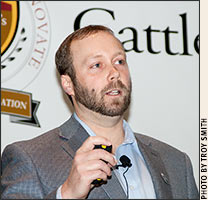Antibiotic Stewardship in Animal Agriculture
Veterinarian Brian Lubbers offers three steps to reduced antibiotic use.
SAN DIEGO, Calif. (Jan. 27, 2016) — How do you define “stewardship?” To paraphrase Wikipedia, stewardship is the careful and responsible management of whatever is entrusted to our care. Veterinarian Brian Lubbers said he believes everyone involved with animal agriculture must be careful and responsible in the use of antibiotics. However, Lubbers’ definition of antibiotic stewardship goes further.
“My definition calls for a continuous commitment to reduced and refined use of antibiotics,” stated Lubbers during the Cattle Industry Convention hosted Jan. 27-29, in San Diego, Calif. The director of clinical microbiology and microbial surveillance at the Kansas State University (K-State) Veterinary Diagnostic Laboratory spoke to beef producers gathered for the annual Cattlemen’s College session.
 To practice refined use of antibiotics, Brian Lubbers said only a product that has been proven effective for the specific need should be used. Afterward, a good steward will evaluate its efficacy in each specific case.
To practice refined use of antibiotics, Brian Lubbers said only a product that has been proven effective for the specific need should be used. Afterward, a good steward will evaluate its efficacy in each specific case.Lubbers cited three steps to reduced antibiotic use. The first is to take preventive measures to keep cattle from getting sick. Secondly, good stewards should try to identify the root cause for each instance that treatment with an antibiotic is needed. Thirdly, they should evaluate the effectiveness of management changes aimed at remedying reasons that animals require treatment with an antibiotic.
“Together, these steps are part of a dynamic process. It’s ongoing,” added Lubbers.
To practice refined use of antibiotics, Lubbers said only a product that has been proven effective for the specific need should be used. Afterward, a good steward will evaluate its efficacy in each specific case.
“To me,” said Lubbers, “the goal of antibiotic stewardship is to minimize the consequences of antibiotic use. Those consequences are the ‘three Rs’ — regulation, residues and resistance.”
Lubbers said resistance occurs when disease-causing organisms adapt such that they can survive in the presence of an antibiotic. He believes more adaptive pressure leads to more resistance.
Residues, the illegal or volative residual amounts of an antibiotic that remain in animal tissue following treatment, typically result from using a product incorrectly. It may be from improper dosage, improper route of administration, or the improper frequency or duration of treatment.
Lubbers said any deviation from directions for use, as described on a product’s label, could lead to residues. Additionally, it could make the drug less effective. To reduce residues, Lubbers urged beef producers to practice and promote Beef Quality Assurance (BQA) measures and zero tolerance for repeat offenders.
Regulation is a consequence resulting in state or federal agencies placing restrictions on the use of certain products. As an example, Lubbers cited the regulation, effective after December 2016, that requires a Veterinary Feed Directive (VFD) for the use of feed-grade antibiotics.
In conclusion, Lubbers said beef producers can minimize the negative consequences of antibiotic use by applying to the management of their animals the same stewardship principles they apply to their families.
Editor’s Note: The articles used within this site represent a mixture of copyrights. This article was written by or under contract of the Angus Journal, an Angus Media publication. If you would like to reprint or repost the article, you must first request permission by contacting the editor at 816-383-5270; 3201 Frederick Ave., Saint Joseph, MO 64506. The Angus Journal claims copyright to this website as presented. We welcome educational venues and cattlemen to link to this site as a service to their audience.

